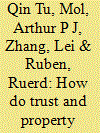| Srl | Item |
| 1 |
ID:
110498


|
|
|
|
|
| Publication |
2011.
|
| Summary/Abstract |
Trust and property rights are generally considered to influence farmers' behavior regarding resource use and environmental management. Previous studies show that higher trust levels may enhance contributions to public goods. This paper investigates how trust and (land) property rights security influence the provision of one concrete public good: land protection through the Sloping Land Conservation Program in China. The analysis is based on household survey data from Ningxia Autonomous Region in China. From our questionnaire two trust factors are derived and distinguished, using factor analysis: general trust and kinship trust. Farm households are less likely to contribute to public goods when they perceive more secure land rights, but trust has mixed effects on public goods. The results show that general trust and kinship trust may rely on two opposite effects for influencing public goods provision. On the one hand, high levels of general trust may directly enhance people's willingness to provide contributions to public goods (by reduced likelihood to reconvert forest land) when farmers are aware of the positive environmental effects of the program, that's the public goods effect. On the other hand, general trust may also make it more likely that people invest more in their own private goods to pursue their own welfare (a more likely reconversion of forest land to arable land), that's the private goods effect. The final outcome depends on the size and direction of both effects. Compared to general trust, kinship trust is more inward-looking and self- or group-interested compared to more reciprocal general trust. Thus, unlike general trust, kinship trust may have no significant public goods effect on the provisioning of public goods.
|
|
|
|
|
|
|
|
|
|
|
|
|
|
|
|
| 2 |
ID:
101160


|
|
|
|
|
| Publication |
2010.
|
| Summary/Abstract |
This paper performs a plot-level analysis of the impact of land rental market participation and off-farm employment on land investment, input use, and rice yields for 215 plots cultivated by 52 households in three villages in Northeast Jiangxi Province. Our findings show that households that rent extra land are relatively more productive, but contradict results of earlier studies which found that tenure status of plots affects the level of land investments. We further find that off-farm employment does not significantly affect rice yields. This result contradicts those of earlier studies which found that the negative lost-labor effect of off-farm employment dominates the positive income effect. Another novel finding is that people working locally off-farm tend to switch from green manure planting towards the use of organic manure on their rice plots. We conclude that policies that will further stimulate the development of land rental markets, which is still in its infancy, can contribute significantly to higher rice production in Southeast China. Another implication of our results is that worries about the negative impact that the continuously growing off-farm employment may have on China's goal to remain self-sufficient in grain production are less relevant at the moment for the region examined in our study.
|
|
|
|
|
|
|
|
|
|
|
|
|
|
|
|